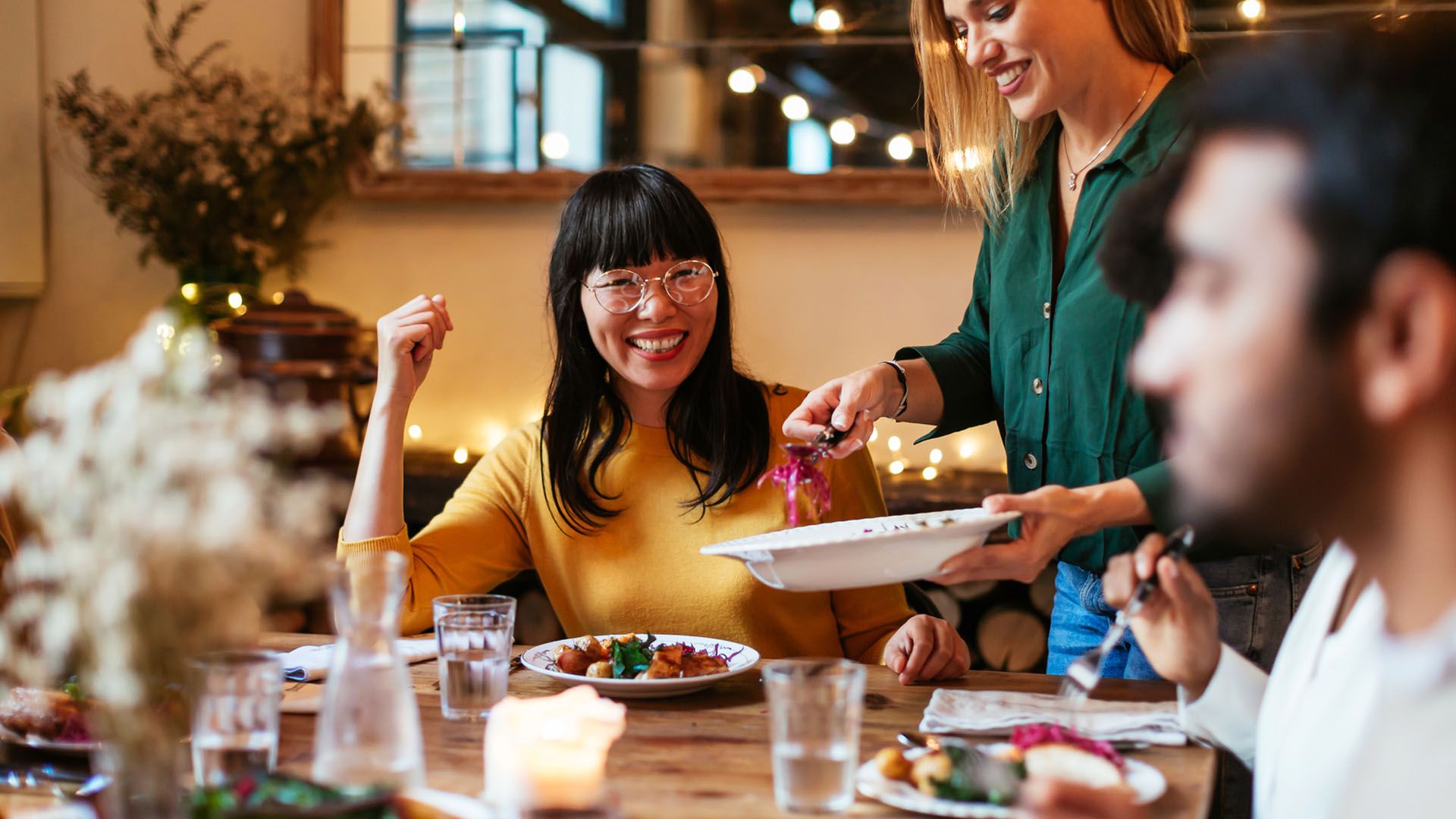Your friends are sources of support, comfort, and fun through good times and bad, but did you know that your friends can actually improve your overall health and well-being, too? Here, experts — and friends we spoke to — share their experiences building, maintaining, and (if needed) ending friendships.
If you’re very lucky, your friends are your partners in adventure, trusted confidants, and chosen family — in other words, priceless additions to your life. Yet it’s all too easy to take friendships for granted.
“We often see adult friendships as a luxury; the first thing we let go of when life gets busy,” says Laura Whitney Sniderman, wellness coach and founder of the friendship platform Kinnd. “Friendships are an absolute necessity for our health and well-being. I really encourage [people] to hold on to friends and put in the effort to keep [friendships] alive.”
“A friendship can take many forms,” licensed social worker Candace Kotkin-De Carvalho tells DailyOM. Kotkin-De Carvalho, the clinical director of Absolute Awakenings, a mental health and addiction treatment facility, says that friendships can be based on shared experiences (like at work) or common interests, even from online communities. We meet and make friends in all sorts of ways. There are our early childhood and school pals; neighborhood friends; work buddies; and so-called “situational friends,” like the people you chat with at one location (the dog park, the gym) and activity friends you see when you’re taking part in volunteering together or participating on your soccer team. All have their place in making your life fuller and richer.
Here, we’ll explore the myriad ways friendships improve our lives. We’ll also look into those heartbreaking signs that a friendship no longer feeds your soul, and what to do about it.
Why Are Friendships So Important?
Though society emphasizes the importance of romantic partnerships, our friendships often serve as some of our most important and long-lasting relationships, whether we’re happily single or in a committed romantic relationship.
Unfortunately, social isolation is on the rise (that was true even before the fallout from the pandemic) and that’s a major problem, because good friendships are a key ingredient for good health. Science has shown that time spent with friends can offer a direct line to happiness and life satisfaction. Friends help stave off loneliness, which can impact our health in a variety of ways: If a person lives in isolation, away from these important social relationships, they are more vulnerable to mental stresses and physical ailments. A life that is rich in social support can serve as its own special immunity against various diseases, from Alzheimer’s to recurrent strokes. In fact, those with stronger social ties have a 50 percent increased likelihood of survival compared to those without those strong connections.
Interested in learning more? Check out Breaking Up With Your Best Friend
Maintaining Adult Friendships Requires Work
Life isn’t always easy, and friends are there to help us navigate rough waters, says Kotkin-De Carvalho. “Friends can provide much-needed emotional support during difficult times — they will listen to our worries and frustrations and offer a sense of understanding. They also celebrate successes with us, providing motivation to keep going when we feel overwhelmed or frustrated by setbacks.”
But adult life is busy with work, childcare, family demands, the needs of our romantic partnerships, and our own personal health, fitness, and life goals — and juggling all of these commitments, plus finding the time to socialize and nurture friendships, can be a challenge.
Prioritize your limited time by thinking about the relationships you value the most, suggests Kotkin-De Carvalho. “Look at the amount of time and energy you can invest in different relationships. Which friendships offer the most emotional support? Which relationships are most meaningful and provide you with a sense of belonging?” With this knowledge in hand, you can ensure that you’re focusing on those friendships that bring you joy.
Stay Present and Connected to Keep Friendship Bonds Strong
Friendships grow and thrive when they are prioritized. There are different ways of staying in touch, but the main goal is to preserve the link with loved ones.
Ganiyat Amusat, a worker in the Nigerian federal civil service, tells DailyOM she makes time to see her friends often, calling these meetups a mix of support group, comedy club, happy hour, and motivation space, depending on how the group is feeling that week. “I wouldn’t trade it for anything!” But Amusat and her friends also keep in touch via a group chat where “we dump our favorite TikToks, tweets, books, and the occasional advice session. It’s a fun way to stay connected.”
You may not be able to take a vacation together, but scheduling a phone call, sending a check-in email, or shooting a friendly “thinking of you” text can be very helpful in building your connection with friends.
Omotege Ohwovoriole, a health writer, tells DailyOM that work keeps her “glued to my laptop,” so seeing friends leaves her feeling recharged. “I’m lucky to have friends that enjoy in-person company. My closest friends and I have a two-week rule. For years, we haven’t gone longer than 14 days without planning a hangout. Our relationships are richer for the times we set aside to huddle together.”
When distance prevents physical gatherings, this can weigh a friendship down. Sniderman recommends you talk to your friend about frequency and connection preferences. “By this, I mean how often you both want to talk, and what format you want to talk in — on the phone, via text, on a video call, etc.,” she adds. To sustain any relationship, it’s important to create new memories together through experiences, Sniderman says, even if they happen online — so watch your favorite show together at the same time and text through it, play online chess, or attend a virtual lecture and talk about it afterward.
“To have an intimate friendship, it requires mutual vulnerability, generosity and reciprocity, and ongoing energy,” Sniderman explains. “When friends open up in this way, it creates the conditions for true acceptance because both people feel seen and appreciated for who they really are.”
There is sometimes a mismatch between what you’re able to give and what a friend is seeking as far as your time and attention, and that can strain your relationship, but Sniderman says, “As long as you can dialogue about your needs with regard to frequency of contact, you can likely find a middle ground that works well for you.”
You can also give your friends constant proof of your presence in their lives. One tender way to achieve this is through simple gifts like the trend of giving adult friendship bracelets. This jewelry can contain pictures, a heartfelt quote, or other personal mementos of your relationship.
How Do You Know if You Have a Good Friend?
Not every friendship is one with a super-close, tell-each-other-everything bond, nor does it need to be to offer you major benefits. After all, even casual acquaintances can contribute to our well-being and happiness. With deeper friendships, however, you’ll notice a unique feeling of fulfillment even if you can’t talk every day, you work in different fields, or you never see eye to eye on your favorite movies. More intimate friendships leave you feeling at peace about yourself and your shared relationship. The best friends are supportive when we need them to be. These friends keep you feeling valued and appreciated, and can spark a smile despite a bad day.
Love, respect, and genuine care are some of the hallmarks of a true friendship. A common thread that runs through these traits is being present for friends when they need it. Taking the time to really listen to your loved ones, responding to their needs, and providing reminders of your love for them are trusted ways to keep a friendship alive. Like any relationship that is important to you, you’ll put effort into maintaining it and prioritizing it.
“One thing I always try to be with my friends is dependable,” says Amusat. “They show up for things that don’t matter — especially those things, sometimes. It’s natural to always be there for each other.”
How to Break Up With Your Best Friend
Even reading that sentence hurts. No matter how long you’ve known a friend, it can be difficult to end a friendship if you feel the relationship is no longer serving you well and is giving you more pain than joy. Some warning signs that it may be time to let go of this friendship include the other person’s unwillingness to compromise, abusive or controlling behavior, or constant negativity and judgment. If you have tried to work through these issues with your friend by speaking to them about your concerns, but they’re unwilling — or unable — to change, it may be time to move on and look for friendships that allow you both to grow, Kotkin-De Carvalho says.
When identifying the main consideration for ending a friendship, Sniderman has one piece of advice: “The key is to try to break up with a friend in a compassionate way, similar to how you might end a romantic relationship.” That means rather than ghosting them, it’s better to speak up, even if that’s difficult and uncomfortable to do. Explain what you’re feeling and why you feel it’s best to give each other space, out of consideration for the times you had together. “No one likes to be ghosted! The most important aspect of ending a friendship is open and honest communication,” Sniderman says.
The Bottom Line
Like any relationship, adult friendships require deliberate effort and care to blossom into healthy, enduring companionships. By prioritizing friends, and knowing when and how to let go of unhealthy connections, you can deepen your most meaningful connections.

